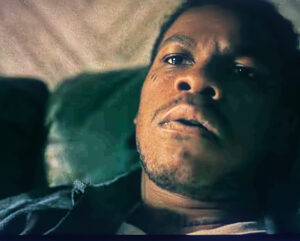
John Boyega in ‘Tyrone,’ from MACRO Media
I often despair of Netflix but was cheered by the recent release of They Cloned Tyrone, a quasi-sci-fi, detective-revenge, dark comedy focused on three characters: Fontaine (John Boyega), a drug dealer taking care of his mom and a young boy; Yo-Yo (Teyonah Parris), a sex worker; and Slick Charles (Jamie Foxx), who is in sex-worker management, so to speak. Kiefer Sutherland has a large part, David Alan Grier a smaller one. The film is excellent.
Going by a trailer, I thought it was a Jordan Peele film in the manner of Get Out, which takes genre conventions—horror—and makes them metaphorical about race in America. If Tyrone was not directed by Peele, I thought, the filmmakers must be using his methods, as the trailer seemed to show a Blaxploitation knockoff that pointed at the Tuskegee experiment.
“Somebody is conducting experiments on us,” says Yo-Yo. By “us” she means Black Americans, which turns out not only to be true but also at a scale to fit the worst conspiracy theories, which the film also uses. The film’s co-writer and director, Juel Taylor, grew up in Tuskegee, Alabama, but has not mentioned the syphilis study in any interview with him I have read.
Taylor told the Times that he and his writing partner, Tony Rettenmaier, had many influences, including The Truman Show, They Live, The Matrix, The Manchurian Candidate, Jackie Brown, Boogie Nights, and The Big Lebowski.
Taylor said he wanted to make a “bootleg Scooby-Doo where the detectives are inadequate but somehow uniquely equipped.” This downplays the film’s ambition and makes Taylor (who is 36) sound like a kid playing around. But Taylor and Rettenmaier met in the graduate film school at USC (and worked together on Creed II and Space Jam: A New Legacy) and seem to have a Tarantino-like encyclopedic knowledge of their art; elsewhere Taylor says two of the biggest influences for Tyrone’s cinematic look were photographers Todd Hido and Gregory Crewdson.
The film is smart in many ways. The dialogue is snappy and often uses elevated phrases or concepts, such as when Slick Charles does a little riff on crossing the Rubicon. Though much of the point here is finding one’s world irreal, physical reality is faithful in the film, as when a car backed into another car by a mortally-wounded man desperate to escape merely stops instead of snowplowing through it, as might happen in most action films. Psychological reality too is often satisfying, as when a humiliated Slick Charles spins on an innocent bystander and says she does not mean anything. And there is the very satisfying sense that even if our conspiratorial fears came true, news of them would probably transmit to others in a confused, slow way and might very well produce no change.
Tyrone combines topics of race relations, poverty, violence, corporate profiteering, the poisons we willingly ingest, cloning and other technologies used for perverse social engineering, attempts to control the country by fascistic means, and the rising-up of people who have finally been pushed too far. (“It’s a revolution!” someone cries.) The ending leaves the way open for sequels, which is not unusual, but in the best way I have seen in years.
In my single viewing, the implications of the evil doers’ plot do seem to go under-used: White technocrats (led by a Black genius, raising questions of “blame and responsibility,” Taylor told NPR) have been cloning poor Black people in a generations-long project that claims “Assimilation is better than annihilation,” but in a world this ruthless, what is holding them back from annihilation? Why, if they can load memories into clone brains, can they not improve lives now instead of creating more slums endlessly for some notion of later change? What does it mean that only certain people are cloned, even in distant cities? Or that when the latest “original” is killed, the next clone, complete with memories, is put out on the street to replace the dead one, even when other characters know they have been killed? Is this some sort of paternalistic taunt, or a will to be discovered?
All of it invites questions in the world the film builds, as well as in ours with its metaphorical co-understanding, but provides no real answers. Still, this is no bootleg Scooby-Doo.
